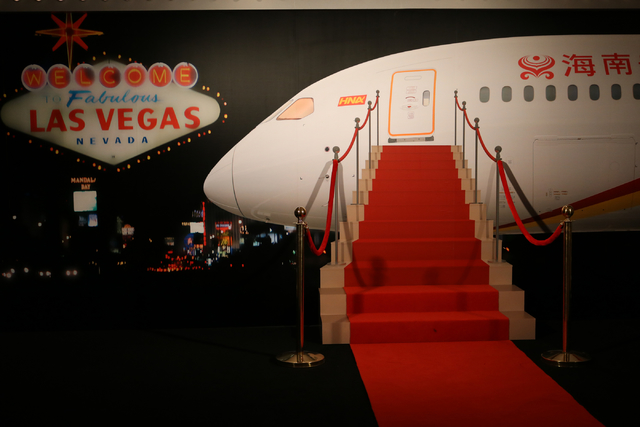In China, Las Vegas tourism officials market less sinful Sin City

BEIJING — The inaugural nonstop Hainan Airlines flight from Beijing to Las Vegas that departs Friday is the culmination of many years of ongoing discussions that included branding Las Vegas to Chinese officials in the most tactful way possible, Las Vegas tourism officials say.
Gambling is officially illegal in China, and the Chinese government has political and historical reasons to frown upon it. China’s official stance on gambling might seem to run counter to Las Vegas’ “Sin City” image, so Las Vegas tourism officials had to find a way to market their city to Chinese officials in a respectful, delicate manner.
Las Vegas Convention and Visitors Authority President and CEO Rossi Ralenkotter said it’s not that he and his team de-emphasized the gambling aspect of Las Vegas when branding Las Vegas to Chinese tourism officials, but that it was “really more of an educational process.”
“The Chinese market and the world knows that Las Vegas is the place for gambling. It’s been the place for gambling for many, many years. So, it’s part of what we have to offer, but we’re so much more than that. That’s really the messaging.”
Ralenkotter said they are branding Las Vegas as a destination that has something to offer every type of traveler.
“There are activities for families to come to Las Vegas, a lot of educational activities, out-of-market outdoor activities, hiking, those types of things,” not to mention a robust trade show and convention destination for business dealings, he said.
At the same time, tourism officials are catering to average Chinese traveler preferences. Brand USA research from 2015 shows that 69 percent of Chinese travelers cited ecotourism and nature as their top reason for choosing to come to the United States. Ecotourism and nature is followed by urban attractions, such as nightlife and city tours, with 65 percent, then cultural and historical attractions with 64 percent, then shopping at 61 percent.
The LVCVA and Hainan Airlines hosted a launch party for the new nonstop service to Las Vegas on Thursday evening, during which this type of messaging strategy was clear.
“Las Vegas attracts over 42 million a year. We had 42 million last year, we’re looking to break that record this year, and 16 percent of all visitors to our city are international,” Ralenkotter told a crowd of about 150 Chinese professionals in the travel industry at The Peninsula Beijing hotel. “We are reaching out and having these partnerships and making sure that we have a destination that provides something for everyone, from the family to the individual traveler to the business traveler.”
Ralenkotter went on to list the varied types of activities available in Las Vegas to the crowd, starting with its proximity to national parks and then on to shopping, dining and other entertainment.
The organizer of the launch party, Nicolas Porembny, who is the North China area manager of Riviera Events, said the LVCVA also shied away from having a gambling-oriented symbolic gimmick at the launch party.
“The original gimmick was to have a huge slot machine and to have the officials from Hainan and Las Vegas pull down the lever together, and then three airplanes would appear lined up on the slot machine,” Porembny said.
Instead, Hainan Airlines and LVCVA officials opted for a large glass ball that had the names of the two organizations in sliding LED lights inside of it.
Porembny said he was told that the slot machine idea sent the wrong message.
Rick Dunham, co-director of the global business journalism program at Tsinghua University, Beijing, said the LVCVA is absolutely playing its cards right.
“The (Chinese) government itself is not changing its position (on gambling),” Dunham said. “So, no matter who you are, if you are trying to appeal to a Chinese audience within China, there are limits in how you can communicate. You’re going to be best off de-emphasizing gambling as a reason people would go to visit your destination.”
Dunham added that because Las Vegas is so well known, the word “gambling” doesn’t even have to be mentioned.
“Las Vegas can sell itself with all of the other assets that it has,” he said.
Gambling is seen as a tool of the imperial powers of the West, Dunham said. During the European imperialistic period in the 19th and early 20th centuries, Dunham said the British forced China to take opium in exchange for Chinese assets, like decorative china, keeping China in debt.
When Mao Zedong came into power in the 1940s and founded the People’s Republic of China, there was a major crackdown of the opium-dens and gambling centers in the big cities that foreigners created and influenced.
“There was a crackdown of what was perceived as sin in the streets: gambling, illegal drugs, drinking and prostitution. So, in that way there’s been historical poetical opposition to gambling. It’s seen as a way that the system took advantage of average people who were desperate to improve their status.”
Contact Nicole Raz at nraz@reviewjournal.com or 702-380-4512. Follow @JournalistNikki on Twitter.